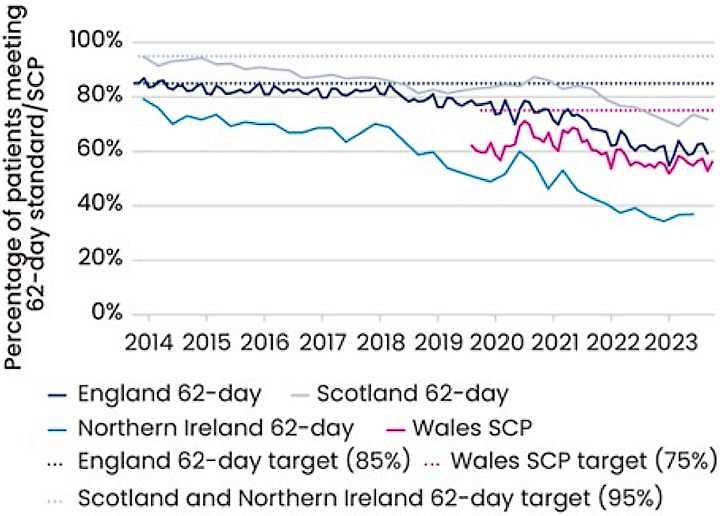The upbeat video from Cancer Research UK is a decade old and they recently released a report suggesting their hopes are not becoming reality.
The January 2024 report did not state that long term cancer survival rates have worsened. They rose from 24% in the early 1970s, to 48% in 2011 and almost 50% in 2018, best current estimates are at a similar level.
Advances in medicine brought the greatest jump decades ago but we then reached a plateau, with three reasons being put forward.
Insufficient Research
The report publishers naturally highlighted this and they are right to do so, when the UK’s position as research leaders is at risk.
Government funding is not at the level research bodies wish to see and has not been for some while. The 2008 financial crash, the Covid pandemic, Brexit, a war in Ukraine and inflation have taken their toll.
Vast sums have been spent covering losses, or helping the wider public to survive. A decision to spend on the many, rather than the needs of smaller numbers, even though we could all end up within that category.
NHS Performance
 As data from Cancer Research UK shows, whilst the pandemic had a notable effect, treatment delays were increasing before this.
As data from Cancer Research UK shows, whilst the pandemic had a notable effect, treatment delays were increasing before this.
The head of cancer intelligence at Cancer Research UK stated “People are waiting far too long for diagnosis and to start treatment, with cancer waiting time targets consistently being missed. And we need to prevent more cancers.”
There have been short term initiatives to improve diagnosis but essentially, the NHS is unable to meet need. Funding, or staffing are part of this, along with an increasing, ageing population and lack of preventative care.
Smoking still makes a solid contribution but obesity now causes around 25,000 cases of cancer each year. Dietary and activity changes which lead to obesity are in themselves believed to further contribute to case numbers.
With almost 65% of UK adults now overweight, or obese, some argue this should be the NHS’s core focus, to stop them being overwhelmed.
Screening Shortfall
Screening is not strictly prevention, as a problem has to exist to be found but most cancers are far more treatable at an early stage. As an example, stage 1 melanoma has a 99% cure rate but stage 4 has a 70% 5 year mortality rate.
There is no national program for skin cancer screening, although this is not high cost and available privately at specialist clinics.
The same applies to other types of cancer and the NHS does offer screening for some, such as breast, or bowel cancer. This could still be widened and as importantly, more rapid action take place where follow up is required.
The Fourth Reason
Whilst not commonly mentioned in reports, there is another reason for serious cancer cases and that is our own inertia.
Not wishing to admit there might be a problem, or take time to seek help is understandable but can literally be fatal. The majority of cancers show symptoms at a fairly early stage, from discoloured urine, to unexpected pain, or an eruption on your skin.
We all have issues which crop up for a day or two but much beyond this, hoping they will go away can be unwise. This is part of the reason a quarter of all cancers over the last decade have been diagnosed as an emergency.
Our clinic can provide immediate skin cancer diagnosis, or treatment but whatever the issue you find, please see your GP, or a specialist if able to. Research and national funding are needed but we can all play a part in reducing cancer.
